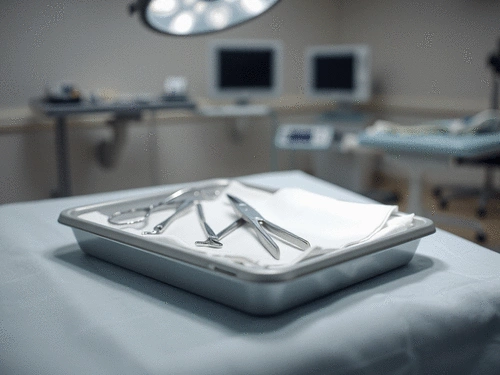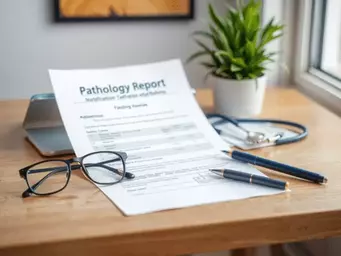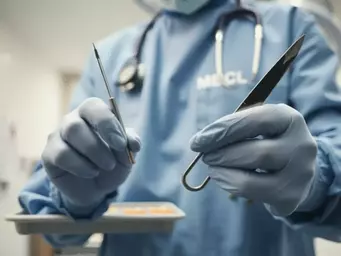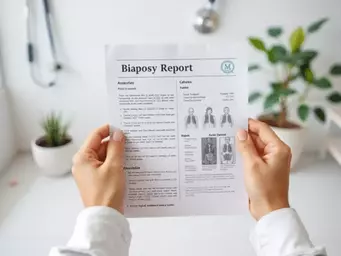Feeling anxious about your upcoming surgical biopsy? You're not alone. Many patients share similar feelings, but understanding the process can ease your worries. Preparation is paramount for a smoother experience and better outcomes. Let’s explore the essential insights to empower your journey!
What You Will Learn
- Preparation is key: Following your doctor's instructions ensures readiness for the procedure.
- Open communication: Asking questions can clarify the procedure and boost your confidence.
- Know your options: Understanding different types of biopsies can help alleviate your anxiety.
- Self-care is crucial: Post-biopsy care is as important as preparation for your overall recovery.
Understanding Biopsy Preparation: A Visual Guide
Preparing for a surgical biopsy involves several key stages, from initial understanding to post-procedure care. This visual guide highlights the crucial steps and considerations for a smooth experience.
What is a Surgical Biopsy?
Removal of tissue for analysis to diagnose health issues.
- ✓ Clarity & Purpose
- ✓ Anxiety Reduction
- ✓ Safety Assurance
Importance of Informed Consent
More than a form – it's your right to understand the procedure.
- ✓ Review with Provider
- ✓ Ask Questions
- ✓ Ensure Comfort
Key Questions to Ask Your Provider
- ‣ What type of biopsy? Why?
- ‣ What to expect during procedure?
- ‣ Preparation for meds/fasting?
- ‣ Post-biopsy complications?
Understanding Biopsy Results
Pathologist interprets samples; results take time.
- ‣ Results: Days to Weeks
- ‣ Provider Review
- ‣ Ask for Clarification
Surgical Biopsy Preparation: Understanding the Basics
When it comes to a surgical biopsy, preparation is key to ensuring a smooth experience. Understanding what a surgical biopsy entails can help clear up any apprehensions you might have. It's not just about the procedure itself; it's about laying a strong foundation for what comes next. From the moment you leave your healthcare provider’s office to the day of your biopsy, being prepared can make all the difference!

In the simplest terms, a surgical biopsy involves removing a small sample of tissue from your body for examination. This sample is then analyzed to provide crucial insights about your health. Preparation is essential for minimizing risks, reducing anxiety, and ensuring a successful outcome. To learn more about various types of biopsies and their purposes, you can refer to resources such as RadiologyInfo.org which offers a general overview.
What is a Surgical Biopsy and Why is Preparation Important?
A surgical biopsy is one of several types of biopsies available to diagnose health issues. It’s performed when other less invasive methods aren’t sufficient. Preparing for this procedure allows you to understand the steps involved and what you should expect. Consider it a proactive approach to your health!
- Gain clarity on the procedure and its purpose
- Reduce anxiety through understanding
- Ensure safety by following pre-operative guidelines
When you’re well-prepared, not only do you feel more in control, but you also set the stage for better communication with your healthcare team.
Different Types of Biopsies: Tailoring Your Preparation
There are various types of biopsies, including needle biopsies, surgical biopsies, and more. Each type has its own preparation requirements. While we focus on surgical biopsies here, it’s crucial to recognize that the specifics can vary based on your condition and the biopsy site. For instance, specific instructions are often provided for procedures like a lung cancer biopsy, ensuring tailored preparation. Tailoring your preparation is essential!
- Needle Biopsy: Generally less invasive and requires minimal preparation.
- Surgical Biopsy: Involves surgical intervention and needs more extensive preparation.
- Skin Biopsy: May require different protocols based on the area being examined.
By understanding the differences, you can ensure you’re adequately prepared for your specific type of biopsy!
Importance of Patient Consent in Surgical Biopsy
Before any surgical procedure, including a biopsy, patient consent is crucial. It’s more than just a form to sign; it represents your right to understand what will happen. As part of my practice at What Is A Biopsy, I emphasize the importance of informed consent. It ensures that you know the risks, benefits, and alternatives to the procedure. For example, specific consent forms for procedures like a breast biopsy detail important considerations before proceeding.
- Review the procedure with your healthcare provider.
- Ask questions if you’re unsure about any aspect.
- Make sure you’re comfortable with your decision before proceeding.
Your active participation in the consent process can help alleviate fears and enhance your confidence going into the procedure. Remember, it’s your health, and staying informed is empowering!
Essential Steps for Surgical Biopsy Preparation
Once you understand the basics, it’s time to focus on the essential steps to prepare for your surgical biopsy. These steps ensure that you’re ready and that your healthcare team has everything they need for a successful procedure.
Pro Tip
Did you know? Engaging in relaxation techniques, such as deep breathing or mindfulness meditation, before your surgical biopsy can significantly help reduce anxiety. Taking a few moments to center yourself can create a sense of calm, allowing you to approach the procedure with a clearer mind and less stress.
Frequently Asked Questions About Surgical Biopsies
What is a surgical biopsy?
A surgical biopsy involves removing a small tissue sample from your body, which is then analyzed to diagnose health issues. It's often performed when less invasive methods are insufficient.
Why is preparation important for a surgical biopsy?
Preparation is crucial for several reasons: it helps minimize risks, reduces anxiety by clarifying the process, and ensures a smoother procedure and recovery. Following your doctor's instructions meticulously is key.
What is informed consent and why is it important?
Informed consent is your right to understand the procedure, including its risks, benefits, and alternatives, before agreeing to it. It ensures you are comfortable and confident in your decision.
What questions should I ask my healthcare provider before a biopsy?
You should ask about the type of biopsy, what to expect during the procedure, preparation requirements (medications, fasting), and potential post-biopsy complications. Open communication is encouraged.
How long does it take to get biopsy results?
Biopsy results can take several days to weeks, depending on the complexity of the analysis. Your healthcare provider will review the findings with you and explain their implications for your health.
Summarizing Your Surgical Biopsy Journey
As you reflect on your surgical biopsy journey, it's essential to focus on the key aspects that can help make the process smoother and less intimidating. Understanding what to expect and being prepared can significantly impact your experience. Here are some key takeaways to keep in mind:
- Preparation is crucial: Following your doctor's instructions will ensure you're ready for the procedure.
- Open communication: Don’t hesitate to ask questions about the procedure or any concerns you may have.
- Know your options: Understanding the different types of biopsies and anesthesia can help alleviate anxiety.
- Self-care matters: Taking care of yourself after the biopsy is just as important as preparing for it.
By keeping these points in mind, you can approach your surgical biopsy with greater confidence. Remember, knowledge is power, and being informed will help you navigate this experience with ease!

Encouragement for Patients: You're Not Alone in This Process
It’s completely natural to feel anxious about your surgical biopsy. Rest assured, you are not alone. Many patients experience similar feelings, and that’s why resources like What Is A Biopsy are here for you. We aim to demystify the process and provide the support you need.
Here are some encouraging reminders:
- You have a dedicated healthcare team by your side, ready to assist you through every step.
- Countless patients have successfully navigated this journey and come out stronger.
- Every question you have is valid—don’t hesitate to reach out for clarity or reassurance.
By acknowledging your feelings and seeking support, you'll likely find the strength to face the biopsy process with a more positive outlook. Remember, your health journey is important, and taking proactive steps will empower you throughout this experience!
Engagement and Further Resources
Connecting with Healthcare Providers: Questions to Ask
When preparing for your surgical biopsy, it's crucial to engage with your healthcare provider actively. Being proactive in communicating can enhance your understanding and ease your concerns. Here are some key questions you might consider asking:
- What type of biopsy will I be undergoing, and why is it recommended?
- What can I expect during the procedure?
- How should I prepare in terms of medications and fasting?
- What signs of complications should I look for after the biopsy?
Having these questions ready will facilitate a productive conversation with your doctor, ensuring that you feel informed and supported throughout your surgical biopsy journey.
Additional Resources for Biopsy Preparation and Support
To further assist you in preparing for your surgical biopsy, we’ve compiled a list of valuable resources:
- What Is A Biopsy – Educational Articles: Explore our comprehensive guides on different biopsy types and what to expect.
- Patient Support Groups: Connect with others who have undergone similar experiences for advice and comfort.
- Healthcare Provider Directory: Find specialists near you for additional consultations and support.
Utilizing these resources can make your experience smoother and provide you with additional support as you navigate through this process.
Understanding Biopsy Results and the Role of the Pathologist
Once your biopsy is completed, understanding your results is the next crucial step. The pathologist plays a vital role in interpreting the tissue samples, helping to provide clarity on your health. It's important to remember that results can sometimes take time, and it’s completely normal to have questions during this waiting period.
Here are a few things to keep in mind about your biopsy results:
- Results may take several days to weeks, depending on the complexity of the analysis.
- Your healthcare provider will review the findings with you and explain what they mean in the context of your health.
- Feel free to ask for clarification on any terms or implications; understanding your results is vital for informed decisions about your care.
Knowing what to expect will alleviate some of the anxiety surrounding the waiting period and support your journey towards better health.
Recap of Key Points
Here is a quick recap of the important points discussed in the article:
- Preparation is crucial: Following your doctor's instructions ensures you're ready for the surgical biopsy.
- Open communication: Don’t hesitate to ask questions about the procedure or any concerns you may have.
- Know your options: Understanding the different types of biopsies and anesthesia can help alleviate anxiety.
- Self-care matters: Taking care of yourself after the biopsy is just as important as preparing for it.
- Patient consent is vital: Ensure you understand the procedure, risks, and benefits before proceeding.










